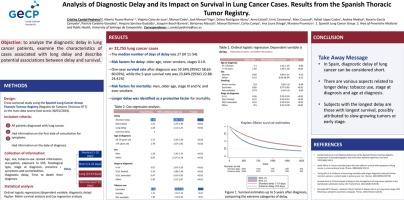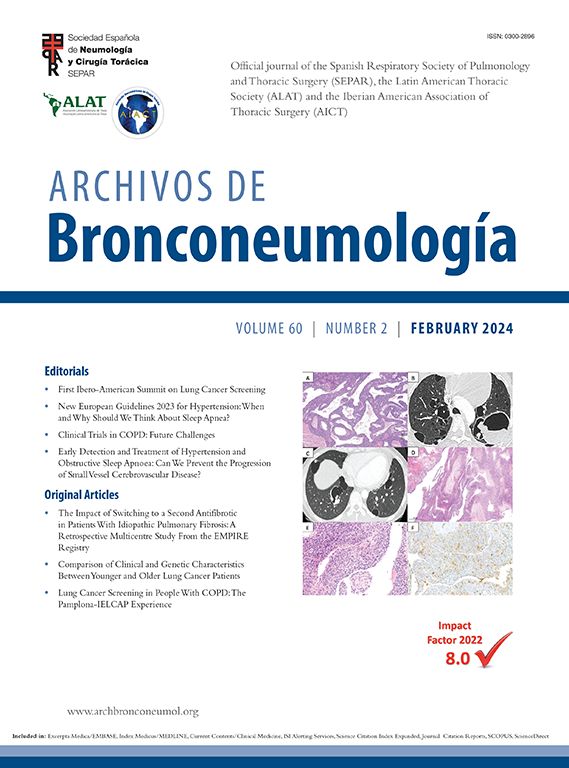Analysis of Diagnostic Delay and its Impact on Lung Cancer Survival: Results From the Spanish Thoracic Tumor Registry
IF 8.7
3区 医学
Q1 RESPIRATORY SYSTEM
引用次数: 0
Abstract
Background
Early detection is crucial to improve lung cancer survival rates. Delays in diagnosis might negatively impact the prognosis of the disease. This study aims to analyze the diagnostic delay in lung cancer patients and describe if there is an association between delay and survival.
Methods
The data source used was the Thoracic Tumor Registry of the Spanish Lung Cancer Group. This analysis was restricted to lung cancer cases with information on the first date of consultation by symptoms and date of diagnosis. The delay was calculated as the number of days between the two dates. A descriptive analysis was performed, and ordinal logistic regressions were fitted with delay as the dependent variable. Kaplan–Meier survival analysis and Cox regression were performed.
Results
22,755 lung cancer cases were included. Never smokers were 1.16 (95%CI: 1.06–1.27) times more likely to register longer delay than smokers. Stage 0–I–II cases had a 3.09 (95%CI: 2.88–3.32) higher risk of longer delay compared to III–IV stages. Overall, 5-year survival rate after diagnosis was 23.64% (95%CI: 22.88–24.41). In those categorized as having the shortest delay 5-year survival was 17.67% (95%CI: 16.31–19.07) and in the extreme delay it was 32.98% (95%CI: 31.28–34.69) (p < 0.001). Adjusted mortality risk was higher in those with the shortest delay (HR 1.36, CI95%: 1.30–1.43) in comparison with the extreme delay.
Conclusions
Diagnostic delay is short among Spanish lung cancer patients, indicating a relatively quick diagnostic process. Extreme delays appear to be associated with higher survival rates, possibly attributed to slow-growing tumors, earlier stage at diagnosis or basically the natural history of this disease.

诊断延迟及其对肺癌生存率的影响分析。来自西班牙胸部肿瘤登记处的结果
背景早期发现对提高肺癌生存率至关重要。诊断延迟可能会对疾病的预后产生负面影响。本研究旨在分析肺癌患者的诊断延迟情况,并描述延迟诊断与生存之间是否存在关联。方法使用的数据来源是西班牙肺癌小组胸部肿瘤登记处。分析对象仅限于有首次就诊症状和诊断日期信息的肺癌病例。延迟时间按两个日期之间的天数计算。我们进行了描述性分析,并以延迟为因变量进行了序数逻辑回归分析。结果共纳入 22,755 例肺癌病例。从未吸烟者比吸烟者延迟时间更长的可能性高 1.16 倍(95%CI:1.06-1.27)。与 III-IV 期病例相比,0-I-II 期病例的延迟风险为 3.09(95%CI:2.88-3.32)倍。总体而言,确诊后的 5 年生存率为 23.64%(95%CI:22.88-24.41)。最短延迟期患者的 5 年生存率为 17.67%(95%CI:16.31-19.07),最长延迟期患者的 5 年生存率为 32.98%(95%CI:31.28-34.69)(p < 0.001)。与极度延迟相比,延迟时间最短者的调整后死亡风险更高(HR 1.36,CI95%:1.30-1.43)。极度延迟似乎与较高的生存率有关,这可能与肿瘤生长缓慢、诊断时分期较早或这种疾病的自然病史有关。
本文章由计算机程序翻译,如有差异,请以英文原文为准。
求助全文
约1分钟内获得全文
求助全文
来源期刊

Archivos De Bronconeumologia
Medicine-Pulmonary and Respiratory Medicine
CiteScore
3.50
自引率
17.50%
发文量
330
审稿时长
14 days
期刊介绍:
Archivos de Bronconeumologia is a scientific journal that specializes in publishing prospective original research articles focusing on various aspects of respiratory diseases, including epidemiology, pathophysiology, clinical practice, surgery, and basic investigation. Additionally, the journal features other types of articles such as reviews, editorials, special articles of interest to the society and editorial board, scientific letters, letters to the editor, and clinical images. Published monthly, the journal comprises 12 regular issues along with occasional supplements containing articles from different sections.
All manuscripts submitted to the journal undergo rigorous evaluation by the editors and are subjected to expert peer review. The editorial team, led by the Editor and/or an Associate Editor, manages the peer-review process. Archivos de Bronconeumologia is published monthly in English, facilitating broad dissemination of the latest research findings in the field.
 求助内容:
求助内容: 应助结果提醒方式:
应助结果提醒方式:


